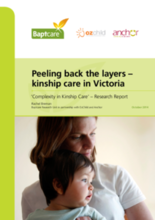Baptcare, OzChild and Anchor, organizations providing Kinship Care services in Victoria, Australia have identified increasing “complexity” in kinship placements and were concerned that the existing kinship care service model did not have the adequate capacity to address this level of “complexity.” Complexity in this case refers to an extensive amount of challenges or “substantial issues” that can negatively affect the wellbeing of the child or the success of the care arrangement overall. These issues could include those in the areas of health, emotional disturbance, social interaction, family conflict, and financial difficulties.
As of the publication of this report, no tool had been developed to assess complexity in kinship care arrangements or the related service needs of children and families in out of home care, nor had any previous research addressed this issue. Therefore, Baptcare, OzChild and Anchor commissioned this research to explore the impact that complexity in care arrangements has on children and families in kinship care. The research explores the effect of complexity in kinship care placements for kinship care families from three organisations: Baptcare, OzChild and Anchor. The research also aimed to identify those indicators of placement complexity that might act as ‘red flags’ at the time of referral, indicating that more intensive and/or therapeutic supports may be required.
The research team found that there are myriad complexities in kinship care arrangements, to varying degrees of intensity, and therefore the children and carers have diverse and complex needs in order to ensure the appropriate care and protection of children in kinship care. For example, the study indicates that many of the children in kinship care arrangements have behavioural issues, some have developmental delays, others are faced with severe physical difficulties and others are having significant problems in school. And as far as the carers are concerned, many reported having conflicts with the birth parents of the child, many also faced financial difficulties. The study revealed that over two-thirds of kinship carers and nearly half of the children in the study were identified as having at least some level of complexity in the case of the care arrangement. Therefore, says the report, “it is no longer acceptable to make broad assumptions that a familial relationship is enough in and of itself to fully meet the needs of children and young people in the out of home care systems.” In order to accommodate these complexities, and meet the related needs of the children and carers, the report suggests that the kinship program model should be reviewed and revised. For instance, the report recommends a better funding structure and more appropriate assessment of children.

